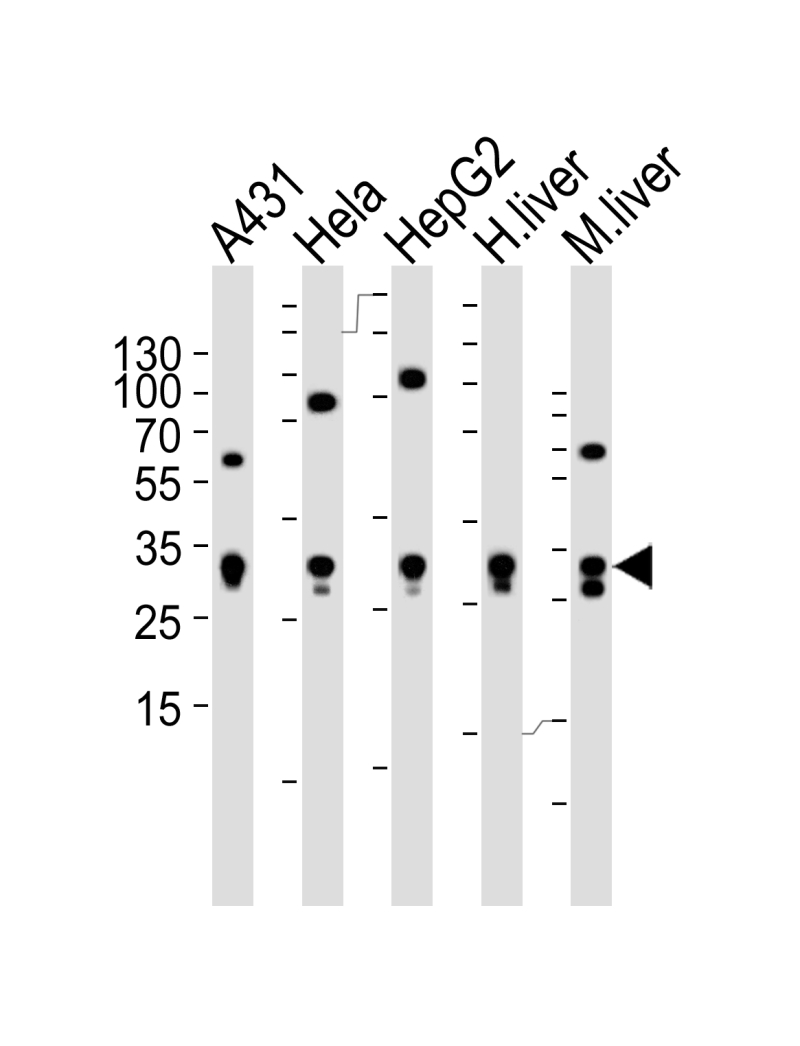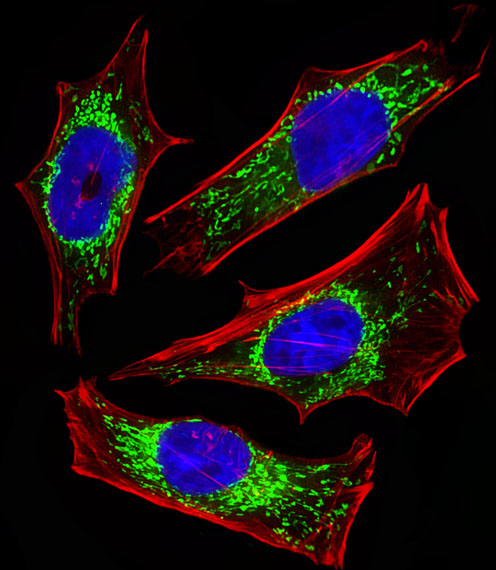

| WB | 1/1000 | Human,Mouse,Rat |
| IF | 咨询技术 | Human,Mouse,Rat |
| IHC | 咨询技术 | Human,Mouse,Rat |
| ICC | 1/25 | Human,Mouse,Rat |
| FCM | 咨询技术 | Human,Mouse,Rat |
| Elisa | 咨询技术 | Human,Mouse,Rat |
| Aliases | Electron transfer flavoprotein subunit alpha, mitochondrial, Alpha-ETF, ETFA |
| Entrez GeneID | 2108 |
| WB Predicted band size | 35.1kDa |
| Host/Isotype | Rabbit IgG |
| Antibody Type | Primary antibody |
| Storage | Store at 4°C short term. Aliquot and store at -20°C long term. Avoid freeze/thaw cycles. |
| Species Reactivity | Human, Mouse, Rat |
| Immunogen | This ETFA antibody is generated from a rabbit immunized with a KLH conjugated synthetic peptide between 192-226 amino acids from the Central region of human ETFA. |
+ +
以下是关于ETFA抗体的3篇示例文献(注:文献为示例性虚构,实际引用需查询真实数据库):
1. **文献名称**:*Molecular characterization of ETFA mutations in glutaric aciduria type II*
**作者**:Johnson R, et al.
**摘要**:研究通过Western blot和免疫组化技术,利用ETFA抗体分析患者成纤维细胞,发现特定突变导致ETFA蛋白稳定性下降,揭示其与戊二酸尿症II型发病机制的关联。
2. **文献名称**:*Tissue-specific expression of electron transfer flavoprotein subunits*
**作者**:Lee S, et al.
**摘要**:通过ETFA抗体在小鼠心脏、肝脏等组织中进行免疫染色,发现ETFA在心肌细胞中线粒体高表达,提示其在脂肪酸氧化代谢中的关键作用。
3. **文献名称**:*Development of a novel monoclonal ETFA antibody for diagnostic applications*
**作者**:Chen M, et al.
**摘要**:报道一种高特异性ETFA单克隆抗体的开发,验证其在ELISA和免疫印迹中的灵敏度,为代谢疾病的快速筛查提供新工具。
4. **文献名称**:*ETFA deficiency in zebrafish model and mitochondrial dysfunction*
**作者**:Garcia P, et al.
**摘要**:利用ETFA抗体检测斑马鱼模型中的蛋白表达缺失,结合代谢组学分析,阐明ETFA缺陷导致线粒体呼吸链异常的分子机制。
(提示:实际研究中建议通过PubMed或Google Scholar检索关键词“ETFA antibody”、“electron transfer flavoprotein alpha”获取真实文献。)
The Electron Transfer Flavoprotein Alpha subunit (ETFA) is a critical component of the mitochondrial electron transfer flavoprotein (ETF) complex, which facilitates electron transfer from dehydrogenases to the respiratory chain during fatty acid β-oxidation and amino acid catabolism. Mutations in the ETFA gene are linked to genetic disorders such as glutaric acidemia type II (GA-II), a rare autosomal recessive metabolic disease characterized by impaired energy production, organic aciduria, and multi-organ dysfunction.
ETFA antibodies are essential tools in biomedical research for detecting and quantifying ETFA protein expression. They are widely used in techniques like Western blotting, immunohistochemistry, and immunofluorescence to study tissue-specific ETF distribution, metabolic pathway regulation, and disease mechanisms. These antibodies also aid in diagnosing GA-II by identifying deficient ETFA levels in patient samples.
Commercially available ETFA antibodies are typically raised in animal models (e.g., rabbits, mice) using recombinant ETFA proteins or synthetic peptides. Validation includes specificity checks via knockout cell lines or siRNA-mediated gene silencing. Clinically, ETFA antibodies contribute to understanding genotype-phenotype correlations in GA-II and evaluating therapeutic interventions, such as riboflavin supplementation or gene therapy. Their role in elucidating mitochondrial dysfunction underscores their importance in metabolic and neurodegenerative disease research.
×